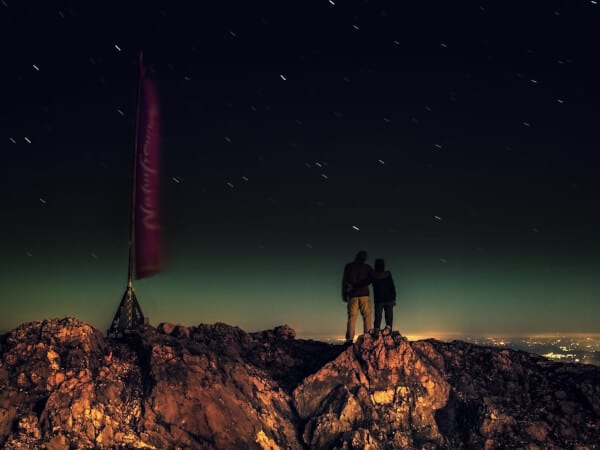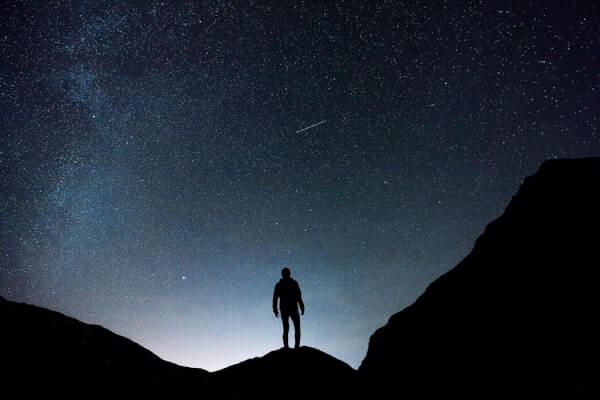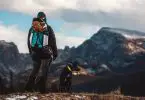Planning for your first night hiking adventure can be a lot of fun, but it can also be difficult. There are a lot of different factors that you have to take into consideration, factors that you might not even need to consider when you go hiking under the sun. It can be easy to make mistakes in the dark, so today we are going to help you plan for your first hike under the stars!
What is night hiking?
Have you ever been out on a hike that has taken longer than you initially expected? The sun going down can be rather daunting, and without camping equipment, people will try to rush the rest of the trail and get it finished as quickly as possible. Night hiking is a relatively similar activity, except for the fact that staying out in the dark is part of the fun.
Night hiking is more of an adventure for people, as even your favorite trail can look like a completely different place as soon as darkness falls. Familiar landmarks that you know to look out for in the distance will completely disappear in the dark.
See also: How to Photograph Stars: Setting up for the Starry, Starry Nights of the 21st Century
You do have to make sure that at least one member of your group knows the trail that you are on well, as you do want to make sure that you do not accidentally wander off of it. Adventuring is a lot of fun, but no one truly wants to end up lost in the woods in the dark.
Are there any benefits to hiking at night?
There are a large number of benefits that come with hiking during the night, opposed to hiking during the day. One of the most important benefits to consider is the cooler weather that comes when night falls. This cooler weather can be important in desert regions and among parts of popular trails, including the world famous Appalachian Trail.
Hiking under the burning hot sun can be uncomfortable, so hiking during the night offers a comfortable escape from the heat for a lot of hikers. You would also be less likely to become dehydrated due to the weather, although you still have to remember to take water with you.
Another popular benefit that night hikers enjoy is nature observation. During the night, nocturnal creatures that otherwise would not be seen come out to play. As your senses heighten your observation will too, allowing you to spot them easily.
Not to mention the night sky, away from light polluted cities where the stars in the sky light up the world in the same way that the sun does. It does take your eyes around an hour to fully adjust to the darkness, so you might not notice this straight away.
What should you consider when planning to go night hiking?
There are a number of different factors that you have to take into consideration when you go night hiking. You should be asking yourself a number of questions, including:
Light source
One of the most important things that you should take with you on a night hike will always be a light source. Some hikers prefer to wear headlamps to light their path, whereas others prefer to let their eyes adjust entirely to the darkness of the night sky. You should also always bring a torch, even if you do plan on letting your eyes adjust entirely to the dark. See our list of the top LED flashlights to guide your way.
Remember that hiking without a headlamp is part of the authentic night hiking experience. If you’re struggling to decide between a headlamp and a torch, you could ask the rest of your group about what they are planning to use as a source of light.
Spare batteries
The full moon will light up your trail, but you have to think about what you will do if the weather conditions change and clouds roll across the sky. As with any hiking trip, you should also make sure that you have spare batteries. Chances are your light source will die as soon as you need it the most.
Food and water
You should also make sure that you have a good supply of food and water within your pack. It will be a lot cooler once the sun goes down so, while it would be highly unlikely that you would become dehydrated, you still need to make sure you are drinking enough water to keep yourself going.
You also need a steady supply of snacks to keep your blood sugar levels high throughout the hike. Make sure that you remember to take all of your rubbish with you, and be careful when cooking as food smells can attract different species of animals. See our tips on how to choose the best water bottle to hydrate yourself adequately.
Hiking equipment
Lastly, remember to take all of the equipment that you would need on a standard hike. You need a map and compass for finding out where you are and navigating the trail unless you prefer a modern GPS device. You also need to take sun protection for when the sun eventually shows up, if you are out that long.
Safety and first aid
Make sure that you bring a pocket knife, a first-aid kit, and a whistle. It is unlikely that you will end up in a bad situation if you know the trail, but you should always err on the side of caution when hiking and have all of the equipment that you need to handle an emergency. See our list of the top first aid kits to make you prepare for any emergencies.
Cellular phone
While not completely necessary, it could be useful for at least one member of your group to be carrying a cell phone. This should be used in an emergency situation. Try not to rely on the cell phone too much, as you might not have access to a strong signal when you need it the most. Don’t run out of batteries. Do read our list of the top travel chargers to use for your gadgets.
How can you keep yourself safe while night hiking?
Whenever you are looking at a new potential hiking spot, the first thing that you have to consider is whether or not you are physically fit enough to handle the types of terrain that you will encounter. Some hikes are easier than others, so you should always try to find one that is suitable for your own skill level.

A lot of night hikers use poles while they are out. This is because poles have been used for centuries to help blind people navigate the world around them, so naturally, they are useful when our vision is not quite as good as it generally is during the day. Remember, it can take up to an hour for your eyes to adjust to the darkness around you. Due to this, a lot of people start their hike as the sun is going down.
What are you going to wear?
As with any hiking trip, you will need to make sure that you are carefully dressing for the right weather conditions. Make sure that you plan ahead and check the weather forecast before your hike. Always plan for the worst weather, especially if you are hiking in an area where the weather can suddenly turn on you.
You should make sure that you are prepared to handle sudden downpours of rain, and you should always bring extra clothing with you. This extra clothing will come in handy if you do get caught out the rain, but it will also allow you to build up a layering system to deal with the cold. As night falls the temperature will drop and you should be prepared for that.
Should you be hiking in a group?
Hiking in a group adds an additional level of safety to your trip. As the saying goes, there is safety in numbers. Having a group of people makes navigating in the dark safer, especially if you lose track of where you are. You should make sure that at least one member of your group knows the trail well. That person will quickly become your lifeline if the trail becomes difficult to navigate.
You do still need to be careful even when you are hiking as part of a group in the dark, making sure that you do a head count at different points along the trail. The last thing that you want to do is lose a person in the dark, so you should always make sure that no one wanders off alone. You also have to be careful if you do choose to wear a headlamp, otherwise, you could accidentally daze a member of your group with the brightness of the bulb.
While it is highly unlikely that something bad will happen on your night hike, your group will become your lifeline in a bad situation. Make sure that everyone knows how to handle an emergency.
How can you deal with your mind playing tricks on you in the dark?
Most people will already know that our minds have the ability to play tricks on us in the dark. This phenomenon is called the Ganzfeld effect. It occurs simply due to sensory deprivation. This leads to our minds running away with us, and playing tricks on us to fill the void that we cannot see. Even Arctic explorers reported hallucinations and an altered state of mind due to the continuous white landscape.
A shadow can quickly become a monster lurking in the dark, and the smallest sound could become something terrifying. You have to try to make sure that you don’t let your mind run away from you in the dark when it can be difficult to identify the noises and shapes that surround you.
Luckily, we can get used to night hiking and the darkness that surrounds us. It does take a little bit of practice, but most people find that altering their attitude so that they believe that they fit in with the nightlife stops their mind from playing games. Talking to your night hiking group can also help, as it stops you from focusing on the smallest of details.
What sort of animals should you expect to see?
You should always research the local animals before you go out on your night hike. For example, if you plan on hiking in an area that is known to be home to bears, you do need to be careful. Making noise is enough to deter most large animals, but you do need to know what to do if one gets a little bit too close for comfort.
You also need to be careful if you plan on using flash photography during the night. The flash could scare local animals, and no one truly knows how much the flash could damage their eyes. For all we know, a camera flash could be as blinding as the sun for a nocturnal owl.
What trail should you use for your first night hiking experience?
We would always advise that you start your night hiking adventure on a trail that you are very familiar with. You can then work your way up to newer trails with your group, but it is not a good idea to set out on a trail that no one in your group is familiar with. A trail that you have hiked multiple times won’t seem as odd at night, although it will still seem quite alien.
The reality is that you can go night hiking on the majority of trails, as long as you are familiar with them. When you are first starting out, you should look for a trail that has a large number of open areas and reflective surfaces. These can make a trail very easy to navigate, and the stars in the night sky will light up the path in front of you.
Some people enjoy going on night hikes in dark forests, as they allow your eyes to fully adjust to the darkness that surrounds you.
So, what are you waiting for?
Hiking during the night offers avid hikers a new way of viewing the world, and a new way of viewing their favorite trails. You can find new adventures, and new animals that hide in the dark. You can also find a comfortable way of hiking in an area that is too warm during the day.
As with any hike, you need to plan ahead. Make sure that you have all of the essential things with you that you would usually take on a hike during the day, including a map and a compass! You should also make sure that you have all of your emergency supplies with you, including a good first aid kit. It can be easy to trip over during the night, when objects at your feet might not be quite as obvious.
Remember that the weather during the night can be just as unpredictable as the weather during the day. You should never go out without a torch hoping to rely on moonlight alone, as clouds can quickly roll in and cover the moon entirely. You should also make sure that you have spare batteries, your torch will probably die at the exact moment when you need it the most!
Having fun while you are out hiking in the night is the most important thing. Don’t let your mind run away with you, and enjoy the time that you get to spend out on the trail.
Featured Image Source: https://unsplash.com/photos/C6duwascOEA








